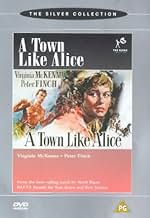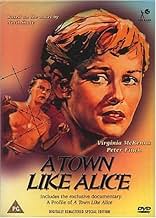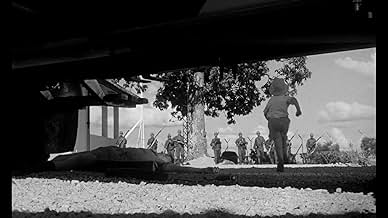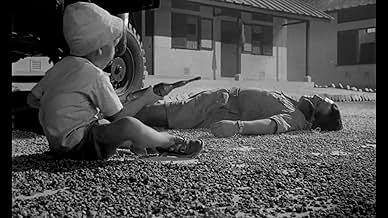NOTE IMDb
7,2/10
2,1 k
MA NOTE
Ajouter une intrigue dans votre langueA newly wealthy English woman returns to Malaya to build a well for the villagers who helped her during war. Thinking back, she recalls the Australian man who made a great sacrifice to aid h... Tout lireA newly wealthy English woman returns to Malaya to build a well for the villagers who helped her during war. Thinking back, she recalls the Australian man who made a great sacrifice to aid her and her fellow prisoners of war.A newly wealthy English woman returns to Malaya to build a well for the villagers who helped her during war. Thinking back, she recalls the Australian man who made a great sacrifice to aid her and her fellow prisoners of war.
- Réalisation
- Scénario
- Casting principal
- Victoire aux 2 BAFTA Awards
- 2 victoires et 5 nominations au total
Kenji Takaki
- Japanese Sergeant
- (as Takagi)
Munesato Yamada
- Captain Takata
- (as Yamada)
Otokichi Ikeda
- Kempetei Sergeant
- (as Ikeda)
Avis à la une
I remember my mother and my aunt watching this film when I was a little boy late once night when it came on television.
They seemed to have cried most of the way through the film. This is an image that sticks in my mind whenever this film is mentioned.
Years later my mother told me how she lost some relatives in the second world war as they tried to escape from the Japanese in Burma by trying to walk it to India. They apparently died of exhaustion
A Town Like Alice adapted from the novel by Nevile Shute looks at a group of women as they shuffle from one Japanese camp to another during occupied Malaysia but no one would take them in. Slowly one by one they perish because of malnutrition, sickness, disease or exhaustion.
During their journey they are accompanied by an old guard who slowly comes to respect them.
During the journey Virginia McKenna meets Australian soldier Peter Finch also a prisoner of war but he does his best to help them out here and there and both fall for each other. However he faces severe punishment when he is found out for stealing some chickens.
The film is told in flashback as McKenna goes back to Malaysia after the war and discovers what happened to Finch.
This is a gritty and unromanticised view of life in occupied Far East, many years before films like Empire of the Sun. Also it is unusual for not being set in a prisoner of war camp, these people want to get there and stay there.
It was filmed in Malaysia and Australia for added authenticity.
Look out for Jean Anderson, many years later she appeared in the BBC television series Tenko which was also women held in a prisoner of war camp in Malaysia.
They seemed to have cried most of the way through the film. This is an image that sticks in my mind whenever this film is mentioned.
Years later my mother told me how she lost some relatives in the second world war as they tried to escape from the Japanese in Burma by trying to walk it to India. They apparently died of exhaustion
A Town Like Alice adapted from the novel by Nevile Shute looks at a group of women as they shuffle from one Japanese camp to another during occupied Malaysia but no one would take them in. Slowly one by one they perish because of malnutrition, sickness, disease or exhaustion.
During their journey they are accompanied by an old guard who slowly comes to respect them.
During the journey Virginia McKenna meets Australian soldier Peter Finch also a prisoner of war but he does his best to help them out here and there and both fall for each other. However he faces severe punishment when he is found out for stealing some chickens.
The film is told in flashback as McKenna goes back to Malaysia after the war and discovers what happened to Finch.
This is a gritty and unromanticised view of life in occupied Far East, many years before films like Empire of the Sun. Also it is unusual for not being set in a prisoner of war camp, these people want to get there and stay there.
It was filmed in Malaysia and Australia for added authenticity.
Look out for Jean Anderson, many years later she appeared in the BBC television series Tenko which was also women held in a prisoner of war camp in Malaysia.
I have the video of this movie which I got a few years back. I wish they would bring this movie out on DVD. Its wonderfully acted. Hard to believe this was based on a true story. I can't believe these women marched hundreds of miles, having nothing to eat much of the time and some of their companions dying along the way. They must have been a hardy bunch. Its too bad more people couldn't see this movie. Virginia McKenna and Peter Finch were excellent as the main characters and the rest of the supporting cast were very good too. I'm glad to have the video, but would very much like to see a DVD come out on it. The movie is in black and white but this in no way detracts from the story or the acting.
I suppose that it should be confessed at the outset that I had the hots for Ms McEnna in her youth. Nevertheless, I still think that this is an excellent movie of the 1950's war genre.
Ginny and Peter Finch provide typically understated performances that are reminiscent of 'Ice Cold In Alex' and 'The Cruel Sea'. Solid, sterling, stiff-upper-lip-stuff that has no place in the spineless, simpering, metro-sexual third millennium.
I have never read Shute's novel, so I cannot comment on what liberties have been taken, but viewed without prejudice as a movie outlining Japanese brutality and human endurance it is still a well-realised piece of work. Everyone gives a thoroughly believable turn, both Caucasian and Oriental alike, as Ms McEnna's character concludes 'you can't really hate anyone' in the end. Though the Japanese - like their Nazi counterparts - did their very best to merit it.
Ms McKenna leads a group of unwanted western women and children, for whom no Japanese officer wants responsibility. So; they get shunted from one place to another, on foot, inadequately fed, and without medical assistance. Inevitably; they begin dying. Finch plays a captured Aussie running trucks for the Japanese. Filmed in black-&-white, in Britain and on location, it offers a very believable turn upon the miasmic swamps, crippling heat, humidity and deluging rain.
Of course, it's a love story too. And here again Ginny and Peter play their parts to perfection. I defy any true romantic not to be rendered lachrymose by her realisation of his survival and their final meeting at the end. Her hasty, last-minute application of cosmetics is particularly touching and well-observed. As if he'd care a hoot one way or the other.
It's a great old feel-good movie for the austerity generation. I give it nine stars and good luck to 'em all I say.
Ginny and Peter Finch provide typically understated performances that are reminiscent of 'Ice Cold In Alex' and 'The Cruel Sea'. Solid, sterling, stiff-upper-lip-stuff that has no place in the spineless, simpering, metro-sexual third millennium.
I have never read Shute's novel, so I cannot comment on what liberties have been taken, but viewed without prejudice as a movie outlining Japanese brutality and human endurance it is still a well-realised piece of work. Everyone gives a thoroughly believable turn, both Caucasian and Oriental alike, as Ms McEnna's character concludes 'you can't really hate anyone' in the end. Though the Japanese - like their Nazi counterparts - did their very best to merit it.
Ms McKenna leads a group of unwanted western women and children, for whom no Japanese officer wants responsibility. So; they get shunted from one place to another, on foot, inadequately fed, and without medical assistance. Inevitably; they begin dying. Finch plays a captured Aussie running trucks for the Japanese. Filmed in black-&-white, in Britain and on location, it offers a very believable turn upon the miasmic swamps, crippling heat, humidity and deluging rain.
Of course, it's a love story too. And here again Ginny and Peter play their parts to perfection. I defy any true romantic not to be rendered lachrymose by her realisation of his survival and their final meeting at the end. Her hasty, last-minute application of cosmetics is particularly touching and well-observed. As if he'd care a hoot one way or the other.
It's a great old feel-good movie for the austerity generation. I give it nine stars and good luck to 'em all I say.
This film is in the same league as the series Tenko for it's realism. I have also watched the mini series which could have it's moments too but the film wins because of the fact that it was made around a decade after it had happened, when things must have been quite fresh in everyones minds. These women were taken captive as the men were but they were not wanted by anyone. These women were far away from home with no clothes apart from what they stood up in, no money and they didn't speak the language. Given those fact the thoughts are so scary!
Soon after the end of real hostilities in 1945, Hollywood produced the first of many subsequent films from the perspective of prisoners of war held by the Japanese: that film was Three Came Home (1950) with Claudette Colbert. I recall seeing that one a long time ago and recall the dark nature of that narrative (I have yet to submit a review here, but I will, in time).
A Town Like Alice is a different kettle of fish, so to speak: instead of a single family, it's a mix of various women and children caught up in the retreat to Singapore in 1941, and follows their seemingly unending trek across Malaya, from camp to camp, seeking admission and a final resting place to wait out the war.
The black and white photography is superb as the downtrodden party weaves its way through swamp, dirt roads, wet and dry season, very little food or water, malaria, dysentery and all other manner of tropical diseases. Little wonder that, as they walk, they also die, one at a time, from malnutrition and sickness, and all the while, their guard, an old-timer, gradually comes to admire their perseverance just as the women come to respect the old man's quiet determination to keep helping them to survive. That's the main story.
The big sub-plot is how Jean Paget (Virginia McKenna) meets Joe Harmon (Peter Finch), also a prisoner of war, and how they both come to fall in love on the run, if you know what I mean: they keep meeting (he is pressed into service as a driver for the Japanese) at different parts of Malaya as the women keep wandering around, looking for a place to stay. So, there is a bit of comedy from the irrepressible Aussie soldiers, mixed with moments of real tension as the two lovers try to keep a relationship going under such conditions. And, it's during one of those meetings that Jean learns that Joe comes from Alice Springs.
Never boring, and with stand-out scenes, such as one of the little boys running in between the advancing Japanese soldiers with his toy gun, shouting "bang, bang" (reminiscent of Brandon de Wilde in Shane [1953], doing the same thing, and annoying Jean Arthur, inside the farm house); the joy of the women when they come across an abandoned house with hot running water; and, Jean's bargaining with a Malay shop-keeper for tinned milk for a baby.
If this period in history is of interest, you could do worse to spend two hours of your time. And, as for how the romance turns out, well, you'll just have to see the movie, won't you?
A Town Like Alice is a different kettle of fish, so to speak: instead of a single family, it's a mix of various women and children caught up in the retreat to Singapore in 1941, and follows their seemingly unending trek across Malaya, from camp to camp, seeking admission and a final resting place to wait out the war.
The black and white photography is superb as the downtrodden party weaves its way through swamp, dirt roads, wet and dry season, very little food or water, malaria, dysentery and all other manner of tropical diseases. Little wonder that, as they walk, they also die, one at a time, from malnutrition and sickness, and all the while, their guard, an old-timer, gradually comes to admire their perseverance just as the women come to respect the old man's quiet determination to keep helping them to survive. That's the main story.
The big sub-plot is how Jean Paget (Virginia McKenna) meets Joe Harmon (Peter Finch), also a prisoner of war, and how they both come to fall in love on the run, if you know what I mean: they keep meeting (he is pressed into service as a driver for the Japanese) at different parts of Malaya as the women keep wandering around, looking for a place to stay. So, there is a bit of comedy from the irrepressible Aussie soldiers, mixed with moments of real tension as the two lovers try to keep a relationship going under such conditions. And, it's during one of those meetings that Jean learns that Joe comes from Alice Springs.
Never boring, and with stand-out scenes, such as one of the little boys running in between the advancing Japanese soldiers with his toy gun, shouting "bang, bang" (reminiscent of Brandon de Wilde in Shane [1953], doing the same thing, and annoying Jean Arthur, inside the farm house); the joy of the women when they come across an abandoned house with hot running water; and, Jean's bargaining with a Malay shop-keeper for tinned milk for a baby.
If this period in history is of interest, you could do worse to spend two hours of your time. And, as for how the romance turns out, well, you'll just have to see the movie, won't you?
Le saviez-vous
- AnecdotesAccording to the book 'The Golden Gong---Fifty years of the Rank Organisation, its films and its stars' by Quentin Falk, "While at premiere of a Disney film, 'Robin Hood' [See: Robin des Bois et ses joyeux compagnons (1952)], he [Earl St. John] was particularly impressed by the young man who played the Sheriff of Nottingham. The name on the programme was that of Peter Finch. St. John bumped into Finch on the stairs of the theatre and invited him to come and talk business at Pinewood. Next day he gave Finch what would be a pivotal role in his burgeoning career: the Australian soldier, Joe, in Ma vie commence en Malaisie (1956).
- GaffesHarry Corbett bought his Sooty puppet from a regular store---he didn't design or create it as such. It's possible therefore that Freddie might have had the same puppet before Harry Corbett gave it national fame.
- Citations
[repeated line]
Japanese Sergeant: Japanese women walk!
- Crédits fousOPENING CREDITS PROLOGUE: "The characters in this story are fictitious. The story itself however is based upon true fact."
- ConnexionsFeatured in A Profile of 'A Town Like Alice' (2001)
Meilleurs choix
Connectez-vous pour évaluer et suivre la liste de favoris afin de recevoir des recommandations personnalisées
- How long is A Town Like Alice?Alimenté par Alexa
Détails
- Date de sortie
- Pays d’origine
- Langues
- Aussi connu sous le nom de
- The Rape of Malaya
- Lieux de tournage
- Kuala Lumpur, Malaisie(establishing shot of British Government Offices - now the Sultan Abdul Samad Building)
- Sociétés de production
- Voir plus de crédits d'entreprise sur IMDbPro
- Durée1 heure 57 minutes
- Couleur
- Rapport de forme
- 1.66 : 1
Contribuer à cette page
Suggérer une modification ou ajouter du contenu manquant

Lacune principale
By what name was Ma vie commence en Malaisie (1956) officially released in India in English?
Répondre


















